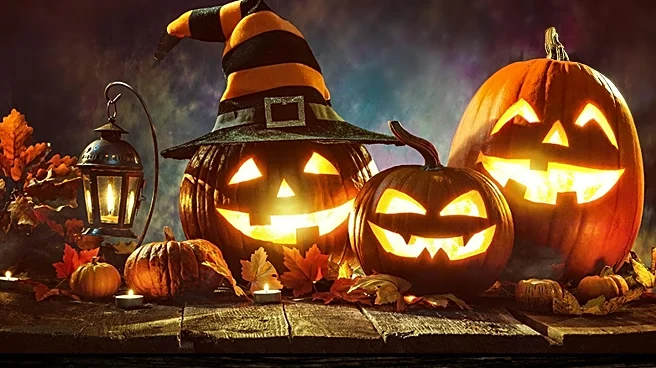What's Happening?
Halloween, celebrated on October 31st, has its roots in the ancient Celtic festival of Samhain. This festival marked the end of the harvest season and the beginning of winter, a time believed to be when
the boundary between the living and the dead was blurred. People would dress in costumes and light bonfires to ward off spirits. The tradition of trick-or-treating is thought to have evolved from ancient customs such as mumming, where villagers dressed as ghosts and demons, performing antics in exchange for food and drink. Jack-o'-lanterns, another Halloween staple, originated from an Irish folktale about Stingy Jack, who tricked the Devil and was doomed to wander the earth with only a burning coal for light. This led to the tradition of carving faces into vegetables, which later became pumpkins in America.
Why It's Important?
Halloween is a significant cultural event in the United States, with Americans spending billions annually on costumes, candy, and decorations. The holiday's evolution from ancient rituals to a commercialized celebration reflects broader societal changes, including the influence of immigration and the blending of cultural traditions. Halloween's popularity also highlights the economic impact on industries such as retail and entertainment, as businesses capitalize on the holiday's festivities. Additionally, the celebration of Halloween in various forms across different countries underscores its global cultural significance, with similar traditions observed in Europe and Latin America.
What's Next?
As Halloween continues to grow in popularity, spending is projected to increase, with Americans expected to spend $13.1 billion in 2025, surpassing previous records. Retailers and businesses are likely to expand their offerings to cater to the growing demand for Halloween-related products. The holiday's cultural impact may also lead to new traditions and adaptations, influenced by changing demographics and societal trends. Furthermore, the environmental impact of Halloween, particularly in terms of waste from costumes and decorations, may prompt discussions on sustainability and eco-friendly practices.
Beyond the Headlines
Halloween's origins and traditions offer insights into cultural and historical shifts, reflecting the blending of pagan and Christian practices over centuries. The holiday's transformation from a religious observance to a commercialized event raises questions about cultural appropriation and the preservation of traditional customs. Additionally, the celebration of Halloween alongside other cultural holidays, such as Dia de los Muertos, highlights the diverse ways societies honor the dead and engage with themes of mortality and remembrance.









